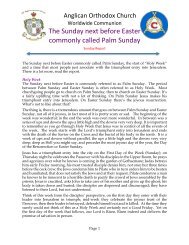170402SundayReport
Create successful ePaper yourself
Turn your PDF publications into a flip-book with our unique Google optimized e-Paper software.
The first day of Lent, commonly called<br />
Ash Wednesday.<br />
The Collect.<br />
LMIGHTY and everlasting God, who hatest nothing that thou hast made, and dost<br />
A forgive the sins of all those who are penitent; Create and make in us new and contrite<br />
hearts, that we, worthily lamenting our sins and acknowledging our wretchedness, may<br />
obtain of thee, the God of all mercy, perfect remission and forgiveness; through Jesus<br />
Christ our Lord. Amen.<br />
This Collect is to be said every day in Lent, after the Collect appointed for the day, until Palm Sunday.<br />
The Epistle for today came from Paul’s letter to the Hebrews, the Ninth Chapter,<br />
beginning at the Eleventh Verse. Paul summarizes both the symbolism and the<br />
substance of the Lord’s sacrifice on our behalf. Paul opens the secret of the One Perfect<br />
Sacrifice, One Time, for All Time and All Mankind. Paul is clearly appealing to the sense<br />
of the Jews when he asks them if the blood of goats will set aside or atone for sin, how<br />
much more can be done by the Perfect Sacrifice made on our behalf?<br />
C<br />
HRIST being come an high priest of good things to come, by a greater and more<br />
perfect tabernacle, not made with hands, that is to say, not of this building; neither<br />
by the blood of goats and calves, but by his own blood he entered in once into the<br />
holy place, having obtained eternal redemption for us. For if the blood of bulls and of<br />
goats, and the ashes of an heifer sprinkling the unclean, sanctifieth to the purifying of the<br />
flesh: how much more shall the blood of Christ, who through the eternal Spirit offered<br />
himself without spot to God, purge your conscience from dead works to serve the living<br />
God? And for this cause he is the mediator of the new testament, that by means of death,<br />
for the redemption of the transgressions that were under the first testament, they which<br />
are called might receive the promise of eternal inheritance.<br />
This morning’s Gospel came from the Gospel of Saint John, the Eighth Chapter, beginning<br />
at the Forty-Sixth Verse and tells the story of Jesus’ confrontation with the Pharisees in<br />
the temple. Like much of John it is filled with deep explanation of Jesus and His purpose<br />
here.<br />
Knowing them looking to find the worst in Him, Jesus asked, “Which of you convinceth<br />
me of sin? And if I say the truth, why do ye not believe me?” In a point central to<br />
Christianity, he went on, “He that is of God heareth God’s words: ye therefore hear them<br />
not, because ye are not of God.” When we hear the term Jews here, we should hear the<br />
world in general, for He spoke to all who would not hear. When they would not hear,<br />
He pointed out He sought not glory or praise from them, but only from the Father whom<br />
in reality they knew not. Here He offers the singular benefit of Christianity, “If a man<br />
keep my saying, he shall never see death.” This concept being foreign to them, they asked<br />
if He thought He was greater than Abraham. That brought the crowning touch, “Your<br />
father Abraham rejoiced to see my day.” Knowing He was only in his early 30s, they<br />
could not grasp how he could have seen Abraham.<br />
In a demonstration of the non-linearity of God’s time, He said, “Before Abraham was, I<br />
am. 4 ” As might be expected, this offended the Keepers of The Law.<br />
4 This response was similar to God’s answer to Moses’ question, “Who do I tell them sent me?”<br />
Page 5



